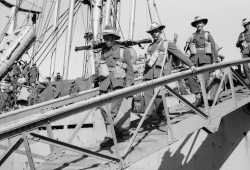Not long after the end of World War Two, Korea was divided into two zones of occupation at the 38th Parallel. The southern zone was controlled by the American forces; the northern zone came under the influence of the Soviet Union. Unable to find a solution to the issue of re-unification, the UN decided to establish two separate nations - the Republic of South Korea and the Democratic People's Republic of North Korea.
The United States, fearful of the spread of communism in Asia after the success of the Communist Revolution in China in 1949, maintained forces in South Korea to protect it against the Communist North.
In June 1950, North Korean forces invaded South Korea, pushing the latter's forces back to the Pusan perimeter. The United Nations decided to send a force to defend South Korea, composed of contingents from 15 nations including Australia, Britain, United States, Canada, Turkey, Greece, Colombia, New Zealand, The Philippines, France, The Netherlands, South Africa and Luxembourg, and medical units from Denmark, India, Italy, Norway and Sweden.
Although the Korean War did not escalate into a world war, it proved to be a long and bloody war. Most of the burden for the war fell on the shoulders of the United States. When the North Koreans were all but defeated, the communist forces of China entered the fray in their defence, thus prolonging the war.
Why was Australia involved in the Korean War?
The nation was substantially in favour of Australian involvement. Many felt that Australia's security may be at risk if the communist aggression was not stopped in Korea. Australia was vulnerable because of its small manpower resources. The Australian Government's decision to enter the Korean war was fully supported by the major Opposition party, the Labor Party.

3RAR disembarking at Pusan port, Korea, 28 September 1950. (AWM 146879)
Like to copy this image? Please click here first
The Americans were also keen for other nations to be involved so it did not appear to be an all American war effort. (Bulletin, 1954) It was also very important for our Government to show its full support for the United Nations. ‘ ... It is indeed a momentous occasion, because for the first time in the history of this Parliament, we have been asked to support action by our Government in implementing the principles of the United Nations.’ (Mr P Spender, Minister for External Affairs).





